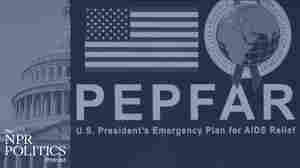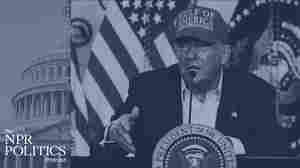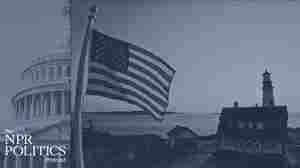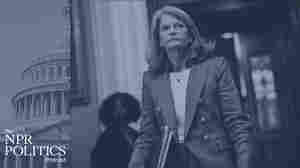President Donald Trump takes the oath of office Jan. 27, 2017, on Capitol Hill in Washington. Jim Bourg/AP hide caption
Political wonks - get wonkier with The NPR Politics Podcast+. Your subscription supports the podcast and unlocks a sponsor-free feed. Learn more at plus.npr.org/politics


The NPR Politics Podcast
From NPR
Every weekday, NPR's best political reporters are there to explain the big news coming out of Washington and the campaign trail. They don't just tell you what happened. They tell you why it matters. Every afternoon.
Political wonks - get wonkier with The NPR Politics Podcast+. Your subscription supports the podcast and unlocks a sponsor-free feed. Learn more at plus.npr.org/politics
Most Recent Episodes
The Department of Justice seal is seen during a news conference Thursday, Dec. 5, 2024, in Memphis, Tenn. George Walker IV/AP hide caption
In the federal court system, law clerks find little recourse for bullying and abuse
In the federal court system, law clerks find little recourse for bullying and abuse
Los Angeles Mayor Eric Garcetti speaks during a ceremony to award Mexican actor/singer/radio personality Angelica Vale a star on the Hollywood Walk of Fame, Thursday, Nov. 10, 2022, in Los Angeles. Chris Pizzello/AP hide caption
Looking The Other Way, Part 1: A powerful Democrat and a #MeToo scandal
Looking The Other Way, Part 1: A powerful Democrat and a #MeToo scandal
President Trump speaks from the East Room of the White House in Washington, Saturday, June 21, 2025, after the U.S. military struck three Iranian nuclear and military sites, as Vice President JD Vance, Secretary of State Marco Rubio and Defense Secretary Pete Hegseth listen. Carlos Barria/Pool, via AP hide caption
The Los Angeles City Hall building is seen in downtown Los Angeles Wednesday, Jan. 8, 2020. Damian Dovarganes/AP hide caption
Secretary of State Antony Blinken speaks about the President's Emergency Plan for AIDS Relief (PEPFAR) at the World AIDS Day event hosted by the Business Council for International Understanding in Washington, Friday, Dec. 2, 2022. Jonathan Ernst/Pool, via AP hide caption
President Donald Trump speaks during a roundtable at "Alligator Alcatraz," a new migrant detention facility at Dade-Collier Training and Transition facility, Tuesday, July 1, 2025, in Ochopee, Fla. Evan Vucci/AP hide caption
An American flag at Portland Head Light catches the light at sunrise, Wednesday, June 11, 2025, in Cape Elizabeth, Maine. Robert F. Bukaty/AP hide caption
Sen. Lisa Murkowski, R-Alaska, leaves the chamber as Republicans planned to begin a final push to advance President Donald Trump's big tax breaks and spending cuts package. J. Scott Applewhite/AP hide caption
The seal of U.S. Department of Homeland Security is seen at the headquarters of U.S. Immigration and Customs Enforcement (ICE) in Washington, Wednesday, May 21, 2025. Jose Luis Magana/AP hide caption









